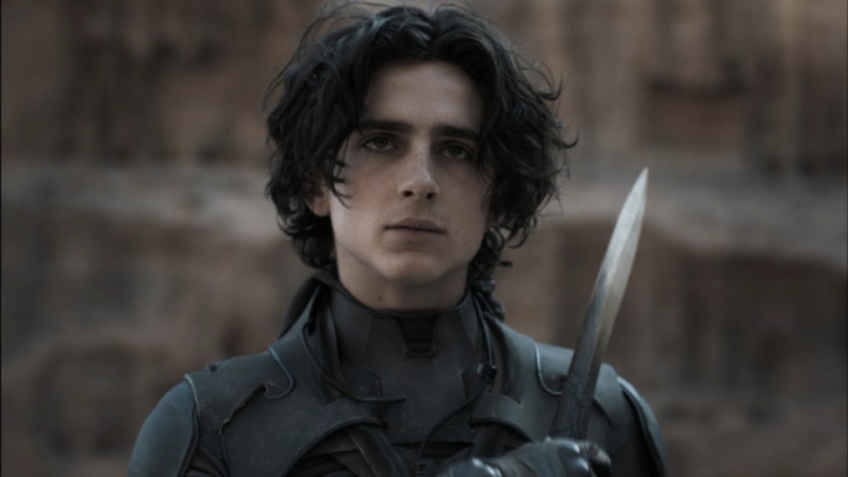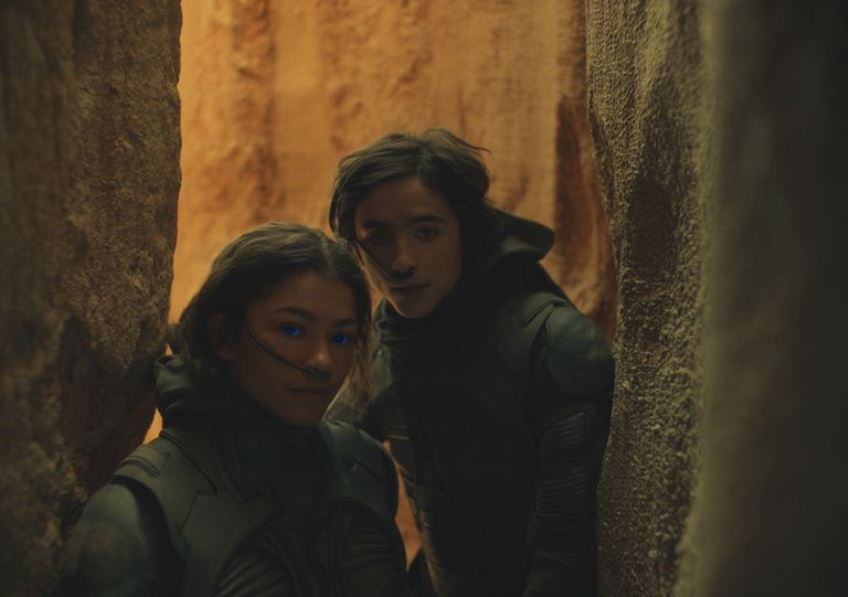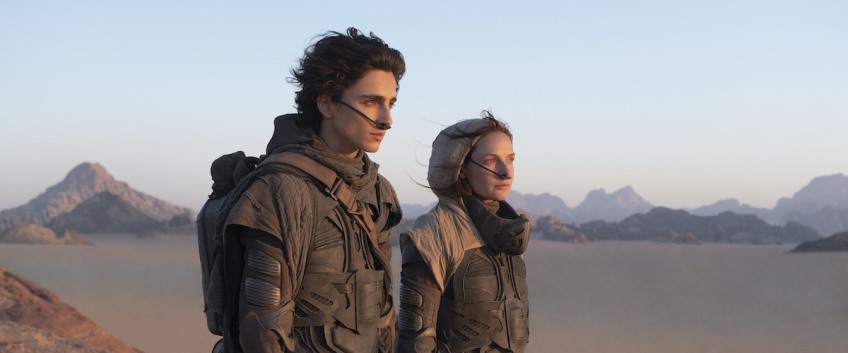Joyce Glasser reviews Dune (October 22, 2021) 12A, 156 mins.
Adapting Frank Herbert’s 1965 cult novel Dune for the screen has proven more of a challenge than climbing Mount Annapurna: only 300 people in the world have succeeded but 73 have died trying. In the film world, only David Lynch succeeded in releasing a completed film – 37 years ago – and it is not the film he’ll be remembered for. Director Dennis Villeneuve (Arrival, Sicario) emerged from lockdown with a grand scale epic film as hotly anticipated as Bond, and even more ambitious than his last film, the sci-fi blockbuster Blade Runner 2049. It has “big screen” written all over it.
The novel is just over 500 pages, and, like Annapurna, has defeated many who have approached it, so Villeneuve and co-writers Jon Spaihts and Eric Rother deserve credit for a film that is not book-dependant (and might disappoint fans of the cult novel as this is only part one of the novel). That said, there is panic when any film opens with captions and exposition-heavy narration which is often the sign of a problematic adaptation. The fear is that if you can’t take it all in, you will be lost. Do not panic: the writers have built in redundancy so that soon enough anything meant to be clear will be.

Paul Atreides (Timothée Chalamet) is the only son of the honourable Duke Leto (Oscar Isaac), the ruler of Atreides, one of several fiefdoms in an intergalactic empire ruled by what you might call, with understatement, a cynical emperor. The emperor has ordered Duke Leto to leave his cold, moist planet, Caladan, where he harvested the bounty and force of oceans, and rule the sweltering, dry, inhospitable planet of Arrakis. Still, it is not without its rewards, for Arrakis has Spice, a sought-after hallucinogenic compound and a substance without which intergalactic space travel is impossible. Audiences in 2021 will, of course catch the metaphor. Ruling Arrakis is like controlling all the drug trade and oil supply of the world, but at a price.
Paul, his mother, Lady Jessica (Rebecca Ferguson) and Duke Leto himself are putting on a brave face, for they are wary of what looks like a poisoned chalice. For the past 80 years the barbarous Harkonnen tribe, led by the sadistic, grotesque Baron Vladimir Harkonnen (Stellan Skarsgard), has profited from the lucrative Spice harvesting on Arrakis. Even if they bow out, respecting the Emperor’s orders, there are other obstacles, including the heat, that makes special protective suits necessary; the blue-eyed, indigenous Fremen people who have set up underground networks from which they might sabotage their occupants; and giant sandworms, that race through the golden desert swallowing up the harvesting machines.
Just from the elaborate set up you gather than Dune is not just a sci-fi movie, but one that, set in 10191 AD, is so many light years ahead that it has reached back in time. Spice harvesting machines that look like giant tank-tractors and airplanes with wings like insects co-exist with fiefdoms, armour, ladies in floor length, formfitting dresses with hoods, and the chivalric loyalty reminiscent of The Arthurian legend. The warriors fight like gladiators with lightsabers (one step beyond Star Wars) not swords. These crackle like lightning with each electrified movement freeze-framed.
And then there’s the mysticism. Forget Merlin, Lady Jessica is an acolyte of the matriarchal sect the Bene Gesserit and is secretly passing on her powers (Paul is learning to communicate telepathically and in a throaty language) to Paul. Jessica believes Paul might be the sect’s long-awaited Messiah, and later on others will, too. When the head of the sect, Paul’s aunt, (Charlotte Rampling) finds out, however, she is not very happy as the sect is matriarchal. This is not where Chalamet’s androgyny comes in handy, although Auntie seems impressed when Paul defiantly enters her chamber for a forced meeting. Instead of girl talk, though, she subjects the young man to a test of pain endurance (with a poisoned needle to his neck if he fails).
Dune then, is essentially a coming-of-age story where the “boy” is a mortal messiah (Herbert’s book is full of these religious references). We see a pampered Paul woken up for breakfast by mum for official duties; given words of wisdom from dad; being a spoilt brat in lightsaber combat training sessions and being taught manly skills by Duncan Idaho, (Jason Momoa), the family’s loyal, all-purpose bodyguard and the valorous Gurney Halleck (Josh Brolin), Paul’s weapon’s teacher and military leader.
This introduces us to the parallel story of Paul coming to terms with his “gift”. Paul’s pleas to join the advance party to Arrakis are dismissed, despite his argument that he could be useful. Paul explains that he has started having dreams of the planet, predicting the death of a warrior. ‘I had the impression that had I been there you would have been alive’ he says, ruminating on his own strange prediction.

In his dreams (visualised rather unimaginatively) Paul is also seeing a mysterious, pretty girl his age, and in one dream he kisses her. Messiah or hormonal teenager? Both, as it happens, but when we finally meet the Fremen girl, Chani (played by Zendaya) in the flesh, it’s a bit anticlimactic. Her disparaging prediction that Paul will die in an initiation duel with a resentful Fremen is not exactly romantic. She does, however, give Paul her sword so he can, at least, die nobly. And when Chani drops the line, ‘they ravage our lands before our eyes’ you may not see a futuristic Greta Thunberg, but you do log onto the environmental messages in the book and film.
Paul also has a mystical connection with the abrupt ambassador from the Fremen people (Javier Bardem) whose meeting with his father does not go well. The House of Atreides is a lot friendlier than the Harkonnen, but they are still the occupiers (The Middle East if not all colonialised nations will flash through your mind).
And if you are wowed by the visuals, but not the story, remember that writers and directors do not have to have adapted Dune to have borrowed from it. In the past half century since the cult book’s publication there’s been Star Wars, Alien, Hellboy, The Avengers Infinity Game, The Avengers Endgame, Guardians of the Galaxy, The Hobbit, Wonder Woman, Avatar and let’s not forget Goldfinger and Gladiator, each grabbing a handful of golden sand from Dune over the decades.
A lot of the film is, then, familiar even if you haven’t read the book. This is a big CGI fest, though the world building on which the film depends is not as novel and imaginative as 2001 a Space Odyssey. Still, there is Chalamet, who might just be the perfect modern-day saviour. In place of brute force, are brains, vulnerability and sensitivity. Instead of macho there is gender fluid beauty. And there is his undeniable charisma, which makes even some clunky dialogue mesmerising.




